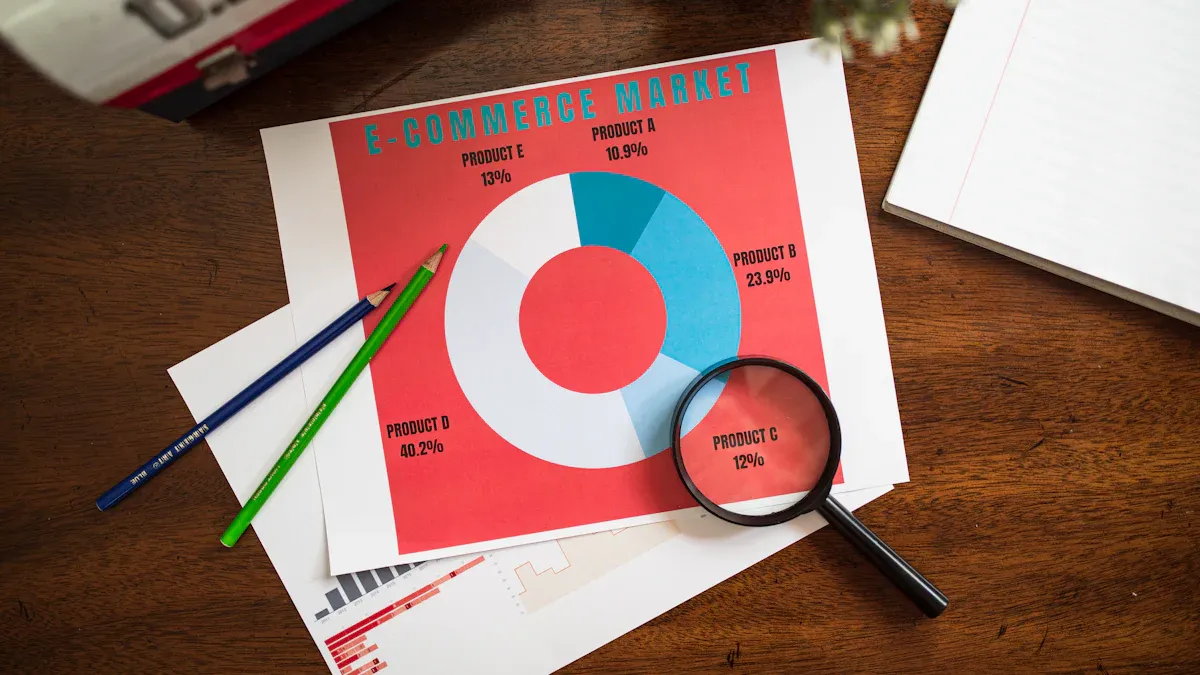AI Influencers and Their Role in Shaping Consumer Behavior

AI 网红 影响力 are transforming the landscape of digital marketing. These virtual characters, powered by advanced AI, share creative content and clear messages. Unlike real influencers, they operate around the clock and provide personalized responses that resonate with tech-savvy audiences. This shift aligns with the demand for targeted marketing as traditional methods become less effective.
The statistics highlight this trend. The virtual influencer market is valued at $4.6 billion and is projected to grow by 26% by 2025. Campaigns featuring AI 网红 影响力 yield an average profit of 13.7%, surpassing the 12.3% profit generated by human influencers. These developments illustrate their potential to influence purchasing behaviors and marketing strategies.
To harness this potential, tools like Lillian simplify influencer marketing. Lillian leverages over 120 million data points to analyze influencers, enhance campaigns, and assist you in making informed decisions. This AI assistant ensures your marketing strategies are well-suited to the evolving online landscape.
Key Takeaways
AI influencers work all the time, helping brands stay noticed.
They use data to create custom content that fits what people like.
AI influencers save money since they don’t need paychecks or trips.
Brands should tell people they use AI influencers to stay honest.
Mixing AI with human ideas makes ads better and more relatable.
The Rise of AI Influencers

What Are AI Influencers?
Definition and technological foundation
AI influencers, also called virtual AI influencers, are digital characters. They are made using smart algorithms and machine learning tools. These tools help them act, look, and even feel like humans. AI influencers connect well with people on social media platforms. Their success is tracked by how much people interact with them, how campaigns perform, and how audiences respond.
How they differ from human influencers
AI influencers are different from human influencers in many ways. They work all day and night without getting tired. They don’t have scandals or unexpected actions, making them safer for brands. They can also be programmed to match a brand’s style and values perfectly. This makes their messages very accurate.
Examples of Notable AI Influencers
Lil Miquela and her impact on social media
Lil Miquela is a popular AI influencer who changed marketing. She has over 3 million followers on Instagram. She works with big brands and connects with people through her unique personality. Her campaigns are 20% more effective than older methods.
Shudu Gram and the rise of virtual fashion models
Shudu Gram is the first digital supermodel in the world. She promotes luxury brands and inspires new ideas in virtual fashion. She shows how virtual influencers can lead industries like fashion and beauty.
Other emerging AI influencers in various industries
AI influencers are now appearing in many areas. Some promote tech gadgets, while others focus on gaming or fitness. These digital figures are changing how brands reach specific groups of people.
Why Are AI Influencers Gaining Popularity?
Cost-effectiveness and scalability
AI influencers save money for brands. They don’t need paychecks, travel, or hotels. This makes them a good choice for both small and big businesses.
Consistency in messaging and branding
AI influencers always deliver the same message. They are programmed to stay true to a brand’s image. This avoids problems that can happen with human influencers. Their steady behavior builds trust with audiences.
Appeal to tech-savvy audiences
AI influencers are popular with tech-loving people. Younger generations especially like new and futuristic ideas. Virtual influencers meet this interest and are fun to follow on social media.
Did you know? The global AI influencer market might grow to $6.95 billion by 2024. This shows how important they are becoming in marketing.
The Impact of AI Influencers on Consumer Behavior
Advantages of AI Influencers
24/7 engagement and responsiveness
AI influencers are always active. They interact with people all day and night. This keeps your brand visible on social media nonstop. Unlike humans, they don’t get tired or need breaks. Their constant activity helps build stronger bonds with your audience. They also follow your brand’s goals, making their presence reliable and steady.
Advantage | Description |
|---|---|
Always active | AI influencers work 24/7 to keep your brand noticed. |
Steady presence | They provide consistent interactions with followers. |
Data-driven personalization and targeted messaging
AI influencers are great at personalizing content. They study lots of data to learn about people’s habits. This helps them send messages that match what people like. For example, they can suggest items based on past choices, making purchases more likely. Using data makes campaigns more effective and saves time.
Innovation in content creation and storytelling
AI tools create fun and creative content. They make videos, posts, and stories that grab attention. These tools let you try new styles and ideas to keep things fresh. AI influencers also use stories to connect with followers. This makes your brand feel more real and relatable.
Challenges in Influencing Consumer Behavior
Authenticity concerns and the 'human touch'
Some people doubt AI influencers. They feel these influencers lack the human connection that real people offer. A study found that 39.1% of buyers care about authenticity when shopping. This shows how important it is to make content feel real and honest.
Building and maintaining consumer trust
Trust is a big issue for AI influencers. While 35% of people are okay with buying from them, most are unsure. Many worry about privacy and how their data is used. A survey showed 81% of people are concerned about how AI companies handle their information.

Potential for misinformation or manipulation
AI influencers might share wrong information by mistake. They rely on data, which isn’t always correct. This can hurt a brand’s image and lose customer trust. It’s important to make sure AI influencers match your brand’s values to avoid problems.
Tip: Be open and honest in your practices. This builds trust and helps connect with your audience.
AI Influencers in Influencer Marketing Strategies
Improving Targeted Marketing
Using AI for audience grouping
AI influencers are great at grouping audiences by studying lots of data. They look at age, habits, purchases, and interests to make detailed profiles. This helps you focus on specific groups more accurately. For example, AI tools can spot patterns in shopping or browsing habits. This helps create campaigns that match what people like.
AI tools study many details to improve audience grouping.
They help send messages that fit what customers want.
This method makes sure your campaigns reach the right people effectively.
Customizing campaigns for different groups
AI influencers make marketing more personal. They understand different groups of people and adjust their messages. This helps them connect with various ages, hobbies, and lifestyles. It builds trust and loyalty with your audience.
For example, an AI influencer selling fitness gear might share tips for young athletes. At the same time, they could offer health advice for older adults. This flexibility helps your brand appeal to many people.
Keeping Brands Safe
Controlled messages and fewer risks
AI influencers give brands more control over their image. Unlike humans, they don’t cause scandals or go off-topic. Their actions always match your brand’s style and goals.
Teams check AI influencers to keep them on-brand.
They avoid problems caused by unpredictable human behavior.
This dependability protects your brand’s reputation and avoids setbacks.
Matching AI influencers with brand values
AI influencers can be programmed to show your brand’s values. Whether it’s about being eco-friendly, inclusive, or innovative, they reflect these ideas in their content. This connection strengthens bonds with customers who share these values.
Tip: Use AI tools to keep your campaigns consistent and meaningful to your audience.
Boosting 24/7 Engagement
Instant interaction with global fans
AI influencers talk to people all the time, no matter the time zone. They reply quickly, keeping your audience engaged and your brand active.
AI influencers have a 2.84% engagement rate, better than humans.
They stay active on social media all the time.
This constant interaction builds stronger relationships with your audience and increases loyalty.
Nonstop content creation and updates
AI influencers create posts, videos, and stories anytime. This keeps your brand fresh and interesting. Their steady updates make sure your audience stays engaged.
By using AI influencers, you can keep your brand visible and achieve long-term success.
How Lillian Helps with Influencer Marketing
Making influencer analysis easier with smart tools
Lillian makes studying influencers simple by using advanced AI tools. It looks at over 120 million data points to give useful tips. This saves you time so you can focus on better strategies.
Lillian is great at understanding audience emotions. It uses AI and A/B testing to group people by their traits. This helps you create messages that connect with your audience's feelings. Lillian also sends alerts when campaign results change. These alerts help you fix problems quickly and stay on track.
Software is now very important in influencer marketing. It handles 65% of tasks, making tools like Lillian essential. Lillian helps you plan, run, and check your campaigns more easily.
Evidence Type | Description |
|---|---|
AI-based audience insights | AI and A/B testing help group audiences for better campaigns. |
Alerts for performance changes | Notifications help you adjust campaigns quickly. |
Software in influencer marketing | Software automates tasks, holding 65% of the market. |
Improving campaigns with automated features
Lillian makes your campaigns better with its smart tools. It studies influencers on Instagram, YouTube, and TikTok, giving real-time updates. This ensures you always have the best information to make decisions.
The platform also suggests ways to improve your content. It helps you match your messages and visuals to what your audience likes. For example, if you're targeting teens, Lillian can suggest trendy ideas they enjoy.
Another helpful feature is Lillian's email creator. It uses AI to write emails that grab attention and get results. This improves your communication with influencers and helps your campaigns succeed.
Lillian’s tools save time and effort while boosting results. It lets you focus on building strong connections with your audience and achieving your goals.
Ethical Considerations of AI Influencers
Transparency and Disclosure
Letting people know about AI-made content
Being honest is key to gaining trust from customers. Many people want to know if they are interacting with AI influencers. A survey found that 73% of adults online think companies should say when they use AI. Apps like Instagram and TikTok now label AI-made content. Influencers are also asked to share when they use AI tools, like for making videos. These steps help people understand how AI shapes the content they see.
Stopping misleading actions in marketing
Good marketing means being truthful. Brands must make sure AI influencers don’t trick people. Being open builds trust and makes people believe in the content. Research shows 81% of people like AI-made personalized ads, but only if the company is honest about data use. By sharing how AI is involved, brands can stay trustworthy and connect better with their audience.
Impact on Human Influencers and Jobs
Fewer jobs for human influencers
AI influencers are raising worries about job loss. They can do tasks like making posts and talking to followers, which human influencers usually do. Since they cost less and can do more, brands might choose them over humans. But this doesn’t mean humans will no longer be part of influencer marketing.
Working together with AI influencers
AI influencers can work with humans instead of replacing them. For example, human influencers can team up with AI to make creative campaigns. These campaigns mix human ideas with AI’s data skills. This teamwork helps brands use the best of both worlds. By working together, brands can make content that appeals to different groups of people.
Privacy and Data Concerns
Using customer data fairly for personalization
AI influencers use data to make content personal. But this raises questions about how data is collected and used. Studies show 82% of people worry about AI affecting their privacy. To fix this, brands should follow rules like GDPR and CCPA. Regular checks can make sure AI uses data fairly and avoids problems.
Solving worries about spying and data misuse
Privacy is a big concern in AI marketing. Research says 57% of people think AI threatens their privacy, and 81% fear companies might misuse their data. Being clear about how data is handled can ease these fears. By explaining data use and having strong privacy rules, brands can gain trust and make people feel safe.
The Future of AI Influencers

Predictions for AI Influencers
More use in everyday marketing
AI influencers are becoming key in marketing plans. They attract brands by engaging people and sharing clear messages. By 2030, the virtual influencer market could grow to $37.8 billion. It is expected to increase by 38.9% each year. This fast growth shows their big role in social media’s future.
Statistic | Value | Year |
|---|---|---|
Market worth | $4.6 billion | 2023 |
Projected market size | $37.8 billion | 2030 |
Brands believing in higher ROI | 71% | 2023 |
Social media users following virtual influencers | 52% | 2023 |
Brands see AI influencers as a way to earn more money. About 71% of companies think they bring better results than human influencers. This shows AI influencers may soon lead marketing in many industries.
Better AI technology for lifelike characters
AI tools are improving quickly. Future updates will make AI influencers act and feel more human. This will help brands create virtual characters that fit specific groups. For example, AI can change its tone or style to match different cultures or ages.

As AI gets smarter, marketers will use it more to connect with people in meaningful ways.
The Need for Responsible Use
Mixing new ideas with honesty
AI influencers bring challenges with ethics. Being honest is very important. A survey found 73% of adults online want to know when AI is used. Brands should make sure their campaigns are clear and truthful. Adding notes about AI use in contracts or asking for audience feedback can help build trust.
Setting rules and following them
To use AI responsibly, brands must follow rules like GDPR and CCPA. Regular checks can make sure AI decisions are fair. These steps will help create rules for the industry. This ensures AI influencers work fairly and protect people’s privacy.
Opportunities for Collaboration
Teaming up AI with human creativity
AI influencers are efficient, but humans bring real emotions. Combining both can make campaigns that connect with many people. For example, human influencers can work with AI to create content that mixes data with personal stories.
Using hybrid models for better results
Hybrid models combine authenticity and efficiency. Brands like Kellogg’s are updating mascots to interact with fans in real-time. This mix of old and new ideas helps brands stay relatable and modern.
Tip: Use hybrid models to combine creativity and technology. This keeps your campaigns fun and effective.
AI influencers are changing how people shop and how brands market. They connect with audiences, share clear messages, and use data to personalize content. But it’s important to use them in an honest and fair way. Being open, real, and careful with data helps keep trust strong.
AI influencers and human creativity can work well together. AI is fast and efficient, while humans add feelings and personal touch. Together, they can make campaigns that appeal to many different people.
Tools like Lillian make influencer marketing easier by giving helpful tips and automating tasks. Using Lillian can improve your campaigns, make your brand more visible, and keep people interested. This mix of smart AI tools and creative ideas helps your marketing stay successful in the fast-changing online world.

FAQ
What are AI influencers, and how do they work?
AI influencers are virtual characters made with artificial intelligence. They use smart programs to act like humans online. These digital figures share posts, talk to followers, and promote brands. Their actions are planned to meet specific marketing goals.
Can AI influencers replace human influencers?
AI influencers are fast and cost-effective but lack human feelings. Instead of replacing humans, they work alongside them. Together, they create campaigns that mix data accuracy with real emotions, reaching more people.
How does Lillian help with influencer marketing?
Lillian makes influencer marketing easier by studying millions of data points. It shows how audiences behave, how campaigns perform, and which influencers work best. With tools like live updates and content ideas, Lillian helps improve your strategies.
Are AI influencers trustworthy?
AI influencers can be trusted if brands are honest. Telling people they are AI and using fair practices builds trust. Explaining how data is used and matching AI influencers to brand values also keeps audiences confident.
What industries benefit most from AI influencers?
Industries like fashion, beauty, gaming, and tech gain the most. These fields attract tech-loving people who enjoy new ideas. AI influencers are great for promoting products with creative stories and clear messages.
Tip: Use AI influencers in areas where creativity and personalization improve audience interest.
